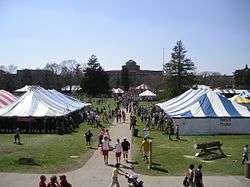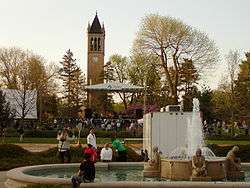VEISHEA
VEISHEA (pronounced "VEE-sha"[1]) was an annual week-long celebration held each spring on the campus of Iowa State University in Ames, Iowa. The celebration featured an annual parade and many open-house demonstrations of the university facilities and departments. Campus organizations exhibited products and technologies, and held fund raisers for various charity groups. In addition, VEISHEA brought speakers, lecturers, and entertainers to Iowa State, and throughout its over eight-decade history it has hosted such distinguished guests as Bob Hope, John Wayne, Tony Bruno, Presidents Harry Truman, Ronald Reagan, and Lyndon Johnson, and performers Diana Ross, Mike Jones (rapper), Billy Joel, Sonny and Cher, the Goo Goo Dolls and The Black Eyed Peas.[2] VEISHEA was the largest student run festival in the nation, bringing in tens of thousands of visitors to the campus each year.

In 2014 a disturbance led the President Steven Leath to suspend VEISHEA, and in August 2014 Leath announced that VEISHEA was being permanently discontinued with the VEISHEA name being retired.[3]
The name of the festival was an acronym for the colleges of the university that existed when the festival was founded in 1922:
- Veterinary Medicine
- Engineering
- Industrial Science
- Home Economics
- Agriculture.
The Iowa State Daily, the university's student newspaper, has spelled VEISHEA as an acronym and as a word, with only the first letter capitalized.[4] Official university paraphernalia regarding the event still put it in full caps, per the trademark owned by VEISHEA and maintained by Iowa State University Trademark Licensing.[5]
Beginning and history
In the early 1900s, the campus of what was then known as Iowa State College was host to multiple events in the spring, as each college celebrated its history and recruited prospective students by holding an individual celebration—such as the Ag Carnival, the Home Economists' "HEC Day," and the Engineers' St. Patrick's Day Parade. In 1922 it was decided that by combining the separate celebrations, it would be possible to preserve tradition without students taking time off from several consecutive weeks of class. Additionally, a large celebration would be a more effective advertisement for the university than several small celebrations. Professor Frank "Shorty" Paine conceptualized the name "VEISHEA" in order to allow the combined celebration to pay homage to each of the colleges and celebrations from which it was born.[6]
VEISHEA was since its inception, a wholly student run event. The first VEISHEA Central Committee, led by Wallace McKee of the class of 1922 met in Beardshear Hall, since the Memorial Union (where student organization offices are currently housed) was not yet built.[7] After months of planning, the first VEISHEA was held May 11–13, 1922. The event managed to combine highlights of each college celebration into one showcase of the entire Iowa State College. Longstanding traditions which became part of VEISHEA included the May Queen pageant, the knighting of senior Engineering students into the Knights of the Order of St. Patrick, and the traditional vaudeville show of the Ag Carnival. Other events included 33 department open houses, a mock battle hosted by the ROTC, a parade themed "History of Iowa State as it is Today," and the student written and performed "Nite Show," titled "Scandals of 1922."[8]
Traditions

VEISHEA encompassed many of the same traditions and ideals embodied in the original 1922 celebration, as well as newer traditions focused on celebrating the Iowa State community. Some of these traditions included:
- VEISHEA Village – VEISHEA Saturday was host to open houses, a cultural festival, an international food fair, and carnival games for children all grouped under the banner of VEISHEA Village. Booths on campus included demonstrations of science and agriculture, refreshments, and entertainment. All together, over 80 departments, clubs, and student groups participated in VEISHEA .
- Stars Over VEISHEA – Originally a yearly student-written musical called the “Nite Show,” in 1930 the directors decided to transition to instead perform Broadway classics. The show was then moved outside to Clyde Willams field in 1939 and renamed Stars Over VEISHEA (or SOV).[9] In later years SOV became a joint production of VEISHEA and Iowa State Theatre, so the show was no longer produced and directed by students, but students still participated in all aspects of the show's planning and performance.
- Parade – What began in 1922 as a parade of floats built by departmental clubs.[10] blossomed into one of the highlights of the VEISHEA celebration, with attendance estimates sometimes reaching as high as 75,000 people.[11] The later manifestation of the parade includes balloons, student groups, marching bands, and dancers, as well as the traditional floats. The parade was led by the Grand Marshal, who is traditionally a distinguished guest.
- Swans – In 1935, the VEISHEA Central Committee donated a pair of swans to Lake LaVerne, the lake at the base of the Memorial Union. After a naming contest, they were christened Lancelot and Elaine.[12] More than 70 years later, Sir Lancelot and Elaine (albeit different swans) continue to be a fixture on campus. For this reason, the swan was one of VEISHEA's symbols, and was represented in the current VEISHEA logo.
- Cherry pies – A tradition older than VEISHEA itself, the Division of Home Economics began selling cherry pies as a fundraiser in 1919. Now sponsored by the Department of Apparel, Events, & Hospitality Management, approximately 12,000 cherry pies were made and sold each year, with the money going to support departmental scholarships.[13]
Problems

In later years, rioting and disturbances tarnished the VEISHEA celebration. Riots marred the event in 1988, 1992 and 1994.[14] During the 1997 VEISHEA festival, Harold "Uri" Sellers, a VEISHEA visitor was murdered in a stabbing on the front lawn at Adelante Fraternity by another VEISHEA visitor, Michael Runyan.[15]
In 2004 a riot occurred during the early morning hours of April 18 after Ames Police dispersed about 400 people at a nuisance party.[16] This crowd grew, intensified, and eventually became violent, ultimately causing over $250,000 in damage to public and private property.[17]
Following the disturbance, some students made claims that police used excessive force in controlling rioters.[18] However, a nine-month investigation by the Iowa Attorney General's office found no wrongdoing on the part of police.[19]
The 2004 riots marred what had been a very successful celebration. On April 27, ISU president Gregory L. Geoffroy announced that VEISHEA would not be held in 2005. This was met with disappointment both on and off campus. One man who had his business damaged had taken out a full page ad asking the school not to cancel the event. Geoffroy also announced the formation of a task force to study the causes of the riots.
2005 marked the first time in 82 years that VEISHEA was not held.
VEISHEA's return in 2006,[20] as well as celebrations in 2007 and 2008, were incident-free. Much of the credit was given to the implementation of new policies recommended by the riot task force, including:
- On Campus Events – Events were moved onto campus and away from the flashpoint that was created by the mix of bars and student housing in Campustown.[21]
- Police-Student Relations – Police have implemented yearly campaigns to build relationships between students and the police, including running ads and giving out free T-shirts.[22]
In 2014 a riot occurred in the early morning of April 9, with one reported injury.[23] In response, Iowa State president Steven Leath suspended the remainder of the 2014 VEISHEA celebrations and created a task force to discuss the future of VEISHEA.[24]
In early June the task force voted unanimously to recommend ending VEISHEA in its current form. On June 13, 2014 the task force voted to recommend that the school continue to have a “overarching, university-wide event." However the task force also recommended it not be called VEISHEA.[25]
On August 7, 2014 President Leath announced that VEISHEA would no longer be held, and that the VEISHEA name was being retired. He said that some of the events that had been associated with VEISHEA would likely continue, but the time frame and the content would need to be evaluated.[3]
References
- The word VEISHEA (pronounced "VEE-sha") from the official site
- VEISHEA History Archived December 3, 2007, at the Wayback Machine from the official 2006 media kit
- Veishea ends at Iowa State; new traditions will begin with 'thoughtful approach', Ames, Iowa: Iowa State University, 2014, retrieved August 7, 2014
- "Despite risks of "unofficial" Veishea, the celebration is still key for Iowa State". Iowa State Daily. May 31, 2012. Retrieved September 5, 2014.
- http://www.trademark.iastate.edu/marks/wordmark/
- Grundmeier, Thomas (April 24, 2007). "VEISHEA celebration large part of ISU history". Iowa State Daily. Archived from the original on September 27, 2007. Retrieved May 30, 2007.
- Grundmeier, Thomas (April 16, 2007). "First VEISHEA traditions began 85 years ago". Iowa State Daily. Archived from the original on September 29, 2007. Retrieved May 30, 2007.
- First VEISHEA from the Iowa State Library's special exhibits section
- Stars Over VEISHEA from the Iowa State Library's special exhibits section
- Parade from the Iowa State Library's special exhibits section
- Traditions from the VEISHEA History section of the official website
- Swans Archived June 7, 2011, at the Wayback Machine from the Iowa State Library's special exhibits section
- Cherry Pies from the Iowa State Library's special exhibits section
- Bui, P. Kim (April 19, 2004). "RIOT ENGULFS VEISHEA". Iowa State Daily. Retrieved January 3, 2012.
- Klein, Emily (April 16, 2004). "1997 murder continues to cast shadow on VEISHEA". Iowa State Daily. Retrieved January 3, 2012.
- Barton, Tom (April 20, 2004). "Report: Hunt Street parties lead to VEISHEA riot". Iowa State Daily. Retrieved December 2, 2009.
- McCarroll, John (March 23, 2005). "VEISHEA will be back in 2006". ISU News Service. Retrieved December 2, 2009.
- Grundmeier, Lucas (April 26, 2004). "Riot complaints sent to attorney general". Iowa State Daily. Retrieved December 2, 2009.
- Temere, Susan (February 5, 2005). "Report: Police actions OK at VEISHEA". Mid-Iowa Newspapers. Retrieved January 26, 2009.
- Jerad, Taylor (April 24, 2006). "* Victorious VEISHEA". Iowa State Daily. Retrieved December 2, 2009.
- Dryden, Jennifer (April 7, 2008). "Move of VEISHEA to ISU campus seen as responsible by Campustown area residents". Iowa State Daily. Retrieved December 2, 2009.
- Andrews, Laura (April 19, 2006). "Frank the Tank". Iowa State Daily. Retrieved December 2, 2009.
- "Riot breaks out at ISU VEISHEA celebration". KCCI. April 9, 2014. Retrieved April 9, 2014.
- http://www.desmoinesregister.com/story/news/2014/04/09/veishea-2014-press-conference/7511395/
- http://www.desmoinesregister.com/story/news/education/2014/06/13/veishea-task-force-keep-event-dump-name/10410071/
Further reading
- Quiet VEISHEA seen as a good sign – Omaha.com
- Astronaut in VEISHEA parade after spending time in space
- Headline: VEISHEA work groups report some findings
- No major trouble at VEISHEA – Omaha.com
- VEISHEA budget balloons with more late-night events
- ISU rule at VEISHEA increases riot risk, some say
- VEISHEA hopes to vanquish history of violence, vandalism
- Headline: VEISHEA group ready to make 15 suggestions
- VEISHEA security goes up – Iowa State Daily: News